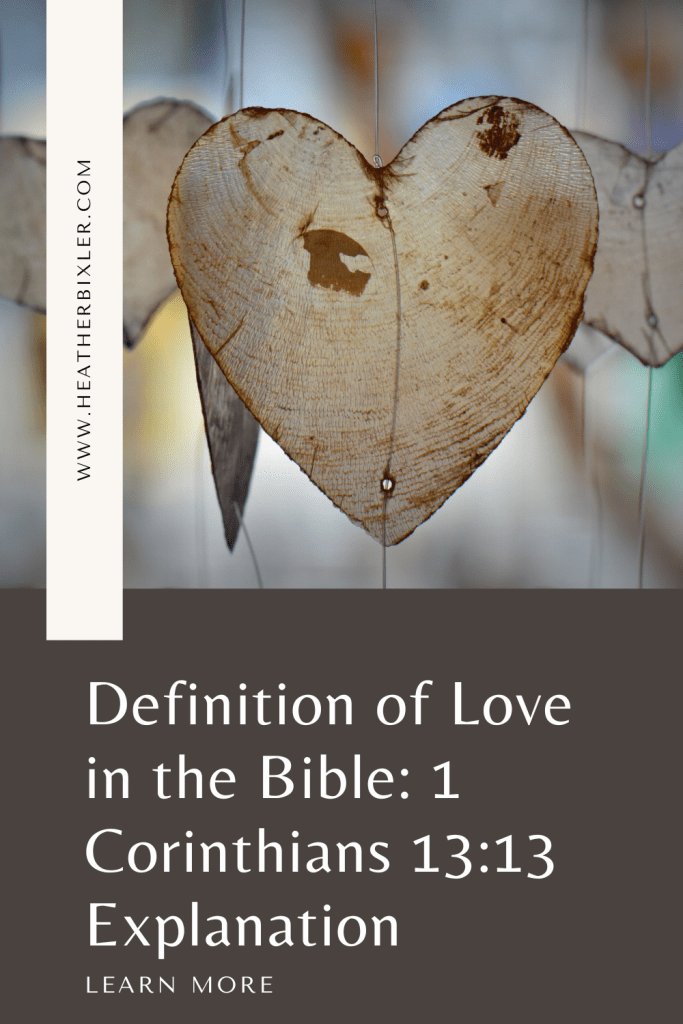Disclosure: Affiliate links have been used within this post; as an Amazon Associate, I earn from qualifying purchases.
The definition of love in the Bible is clearly outlined in the love chapter, but you probably have an idea of what love means to you through simply living your life. You also probably have a good idea of what love isn’t, too!
Some of the most meaningful moments in your life will be centered around love. Those moments might include your sacrifice of time or money to care for someone you love. Or you might be in a season of sadness, grief, and suffering because you lost someone you love. Sometimes those meaningful moments are because you are celebrating the moment you fall in love with your future spouse, or you finally get to say “hello” to that newborn face you’ve dreamt about for the past nine months.
Love creates beautiful moments in your life, even if those moments make you cry – but especially if they make you happy!
So what is the definition of love in the Bible? 1 Corinthians chapter 13 is known as the love chapter in the Bible. In this chapter, you will find clear instructions and guidance on the Biblical definition of love. In this article, we will look at the definition of love and why love is the greatest in 1 Corinthians 13:13.
Why is love so important?

Love is important because it sets us free and guides us in this life. As a believer in Christ, you don’t have to wonder about how you need to respond to people who hurt you or struggle with guilt for the beautiful blessings you have in your life.
Taking a deep dive into the “love chapter” in the Bible will not only help you to understand what it means to love your family and friends – it will teach you how to love your enemies and even love yourself. But it will also help you to understand the character of God even more since scripture states God is love in 1 John 4:16.
We know and have believed the love which God has for us. God is love, and he who remains in love remains in God, and God remains in him.
1 John 4:16 (WEB)
1 Corinthians 13:4-7 Biblical Definition of Love
When we look at 1 Corinthians 13:4-7 (WEB), we see the key elements of love according to Paul. I am going to list them below for easy reference and for a better understanding of how each element of love is a powerful testimony to the beauty of God’s love in your life.
- Love is patient.
- Love is kind.
- Love does not envy.
- Love does not brag.
- Is not proud.
- Does not behave itself inappropriately.
- Does not seek its own way.
- Is not provoked.
- Takes no account of evil.
- Does not rejoice in unrighteousness.
- Rejoices with the truth.
- Bears all things.
- Believes all things.
- Hopes all things.
- Endures all things.
The Biblical definition of love includes one of sacrifice and is consistent with putting aside your wants and needs in order to give to others. Genuine love is demonstrated through selflessness, patience, kindness, and forgiveness. When it comes to Faith, letting the Holy Spirit refine your heart to be more loving is essential.
Jesus clearly outlines in the bible that loving God and loving your neighbor are the two greatest commandments in Matthew 22:37-40:
Jesus said to him, “‘You shall love the Lord your God with all your heart, with all your soul, and with all your mind.’ (Deuteronomy 6:5) 38 This is the first and great commandment. 39 A second likewise is this, ‘You shall love your neighbor as yourself.’ (Leviticus 19:18) 40 The whole law and the prophets depend on these two commandments.”
(WEB)
When studying love in the Bible, we need to understand the importance of love in the life we live on this earth and the eternal impact love has on our lives.
1 Corinthians 13:13 Explanation
I was in a season where I was struggling with my faith. My husband was just diagnosed with a rare and chronic illness, and this felt like a huge roadblock to the plans we had for our future. I had no idea what to do, and I felt hopeless and helpless because the options for addressing this illness were not promising. My husband and I did not have the answers we were hoping for, so I looked to God to try and understand the why, what, and how of this situation.
- Why was this happening to us?
- What is the purpose of this trial?
- How do we move forward?
I was praying constantly and hoping God would help me through the trial and give me and my loved ones deliverance and healing. But it felt like God was quiet and slow in providing the answer I desperately wanted. Going through this trial with a discouraged heart was not helpful, and I thought about the eternal impact this trial had on my and my family’s lives. What if death was how this story would end, then what?
1 Corinthians 13:13: Faith, hope, love
This season of life led me to study scripture about eternity and heaven – the place where every tear will be wiped away, and all sickness and disease will be healed. One of the verses I clung to in that season was 1 Corinthians 13:13.
In 1 Corinthians 13:13, we see that faith, hope, and love are eternal, but the greatest of these is love.
But now faith, hope, and love remain—these three. The greatest of these is love.
(WEB)
This made it clear to me that no matter what, I needed to build my faith, always have hope, and learn to love better.
Your life is full of triumphs and trials, and while suffering is something that everyone goes through on this earth, you need to understand the eternal impact your suffering has on your life on this earth and your eternal life. Believing and trusting in Jesus gives you the opportunity to live eternal life in Heaven with God, and it also gives you the opportunity to begin living with faith, hope, and love right now during your trials and triumphs.
1 Corinthians 13:1-3 Meaning
In 1 Corinthians 13:1-3, Paul talks about how the gifts we have in this world mean nothing if we do not have love. Understanding this verse while discovering the definition of love in the Bible is essential to understanding why love is so important. This is a new perspective within the Body of Christ. I know I tend to feel good about myself simply because of the gifts and talents God has given me. I also struggle with feeling like my identity is lost when I am struggling with these gifts.
Theodore Roosevelt once said:
Nobody cares about how much you know, until they know how much you care.
Theodore Roosevelt
As a believer, you have been given spiritual gifts that you are supposed to steward in this life to help further God’s Kingdom. But do you steward these gifts in love? I know sometimes I don’t.
This is a hard pill to swallow because we like to flaunt our gifts because we feel like they make us special. But the truth is God has no favorites, and our gifts don’t make us special. They do, however, make us a unique member of the Body of Christ. We have unique talents designed to serve others and ultimately serve God. So our gifts have never been nor will they ever be our own or for our own good.
As believers, we need to consider the eternal impact our actions have on ourselves and those around us. If we are using our gifts and blessings for our own selfish gain, or if we do not have love in our hearts, then our gifts and blessings have the potential to do the exact opposite of what we are called to do: Love God and Love Our Neighbors.
What is the Meaning of “love is patient and love is kind?”
The definition of love in the Bible is clear – love is patient, and love is kind. Reflect on the last time you were dealing with someone who you were disappointed with. I’m sure in your heart you truly love them, but were you patient and kind with them?
As believers, we revert to a heart that is full of condemnation rather than love. This is especially true when dealing with our own emotions and frustrations. When we hear the words Love is Patient and Love is Kind, we need to remember this is a guideline on how we need to treat other people and how we should treat ourselves.
Jesus and the Adulterous Woman
In the Bible, Jesus is seen drawing a line in the sand for a woman who is caught in adultery, and he tells everyone standing there, ready to stone her and condemn her to death, that whoever was without sin should cast the first stone. The woman’s accusers were not being patient or kind to her, but Jesus was all of those things and more.
In the parable about the adulterous woman, after everyone drops their stones and leaves, Jesus turns to the woman and asks her who condemns her. She realizes no one, and then Jesus tells her to go and sin no more. What kind of life would this woman have had if she had just turned around and lived one filled with self-condemnation? I’m sure she would’ve gone and sinned again and again.
Not only did Jesus protect her from being condemned by the crowd, but the patience and kindness He showed her helped her to learn how to be patient and kind to herself. This parable shows us the clear definition of love in the Bible is one that helps to free everyone, including ourselves, from condemnation through patience and kindness.
Why is love the greatest in 1 Corinthians 13?
Love is the greatest because this is the foundation on which faith and hope are built. As we see at the beginning of 1 Corinthians chapter 13, our faithful and obedient acts mean nothing if we don’t have love.
Your hope for the future in difficult times won’t stand a chance against a hostile future or a hostile mind. Without love, it is easy to believe the lies that come your way. Nobody else needs to condemn you because you will do that on your own if you don’t have love.
Do you believe God is love, He loves you, and are you loving towards yourself? Do you think this will help you develop a loving attitude towards others?
What is the lesson of 1 Corinthians 13:13?
The definition of love in the Bible, according to 1 Corinthians 13, is to prioritize love above all else. 1 Corinthians 13 underscores that love is not only essential but also supreme, enduring, and transformative. Love should be the guiding principle in how Christians relate to God and one another.
Learn more about the author, Heather Bixler, by clicking here.
Disclosure: Amazon book links provided are affiliate links. As an Amazon Associate, I earn from qualifying purchases.

